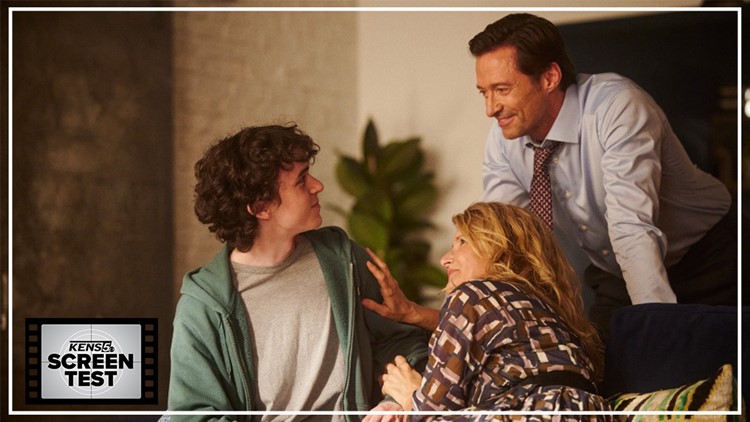TEXAS, USA — The biggest moment of clarity in Florian Zeller’s “The Son” is also its most dispiriting, arriving at a point when the film has stumbled around the same narrative corner for much of what we’ve seen. Only now it reveals itself to have been blindfolded.
Saddled with an ill-timed collision of events forcing him to turn down a lucrative gig so that he can ostensibly focus on a teenage son coping with severe depression, Peter (Hugh Jackman, trading mutant affairs for human ones) is paying a visit to his father, Anthony Hopkins in an unnamed role. In Peter’s eyes we see a blend of reticence, confusion and paternal concern. But Hopkins’s wealthy character – far from the wise and self-scrutinizing grandfather he played in last year’s “Armageddon Time” – responds by chastising Peter, saying he’s taking advantage of the situation to prove he’s developed into the kind of father that an obsession with work prevented Hopkins from ever being.
It’s a volatile moment for the two characters and for “The Son” itself, taking its themes of familial selflessness and costly selfishness further up the intergenerational rung. But widening the ripples of his ideas comes at a cost for Zeller, submerging one major perspective in uneasy ambiguity that rusts whatever else there is to come. Who is the titular son his sophomore film effort is chiefly concerned with if not Peter’s teenage boy, Nicholas (Zen McGrath)? And to what end does the answer shape those around them?
If the French playwright’s script was as deliberate as his cinematically vigorous debut “The Father,” maybe those questions would carry some heft. Instead we’re left wondering how the director of that movie, which empathized with its most vulnerable character through ingenious and immersive staging, could make “The Son,” a misguided mental-health drama barely able to lift its most emotionally turmoiled character beyond the status of mere plot device.
For most of “The Son’s” first hour – narratively pivoting around Nicholas moving in with Peter, Peter’s new wife (Vanessa Kirby) and the newborn brother he hasn’t yet met – the issue boils down to an oversimplified script from an outdated era of storytelling about husbands and wives, parents and children, obstacles and reconciliations. While the faultlines of Peter’s recent separation with Kate (Laura Dern) are still wide enough that they have to mind themselves when creeping around the edges, it isn’t until they discover Nicholas has been skipping school for weeks that past relationships have to find common ground with present realities.
The drama here is more lightly seared than wholly engulfed. Contrary to the gripping precision of “The Father” – as much a psychological thriller as it is an empathetic portrait of an elderly man’s battle with dementia – “The Son” glides along at the leisurely pace of a family that can afford to glide through life at a leisurely pace. Peter is rising through the ranks at his job, Kirby’s Beth is nurturing their new family and Kate is more or less on amicable terms with the both of them.
Or at least that’s how the adults are behaving on the outside, a mask they’re incentivized to continue wearing for the good of Nicholas despite his depression resurfacing some rifts. Zeller shares the teen’s story largely from Peter’s removed perspective, which might have been an interesting decision if Nicholas’s crisis – the portrayal of which escalates from angsty, cliched reclusiveness into some genuinely hard-to-watch moments – didn’t feel like an excuse for Zeller to outsource the movie’s devastation and fury to the adults in the room. “The Son" never sticks with the son long enough to unearth new truths about the ways we cope with mental health today; scenes that center on him always seem to cut away before we expect them to, as if the film were emphasizing how much of an afterthought he is to Peter.
But what does that say about Zeller? His second film returns cinematographer Ben Smithard and editor Yorgos Lamprinos from the first, and the mantra this time around appears to have been to neutralize the intensity of “The Father’s” filmmaking. Perhaps the idea was to emphasize how seismic and sudden Nicholas’s diagnosis would be. Too bad that a medley of blank stares, tonally jarring song choices and bland shot selection keep things as rote as they were before.
The script doesn’t fare better than the direction, and things take a turn for the extremely dubious when we begin to suspect that indifference might be more than just a character trait of Peter's. “It’s as if you’re doing this to me,” he tells Nicholas, gripping him by the shoulders after suicidal thoughts reach new levels of urgency. Damning as the words may reflect on Peter, they represent an even more pressing indictment on Zeller (who, along with Christopher Hampton, adapted the film from his own play). The film may very well be signaling that Peter is the character to interrogate, but its manner of keeping Nicholas at a distance within the narrative suggests otherwise. Zeller has said he wants to start meaningful conversations about mental health with “The Son,” an admirable aim. But this movie feels too much like an interrogation, and too at odds with its own priorities to ever convince us why we need to care about Peter’s.
"The Son" is rated PG-13 for mature thematic content involving suicide, and strong language. It's now out in San Antonio theaters. Runtime: 2 hours, 3 minutes.
Starring Hugh Jackman, Vanessa Kirby, Laura Dern, Zen McGrath
Directed by Florian Zeller, written by Zeller and Christopher Hampton
2023
---
>MORE REVIEWS:



